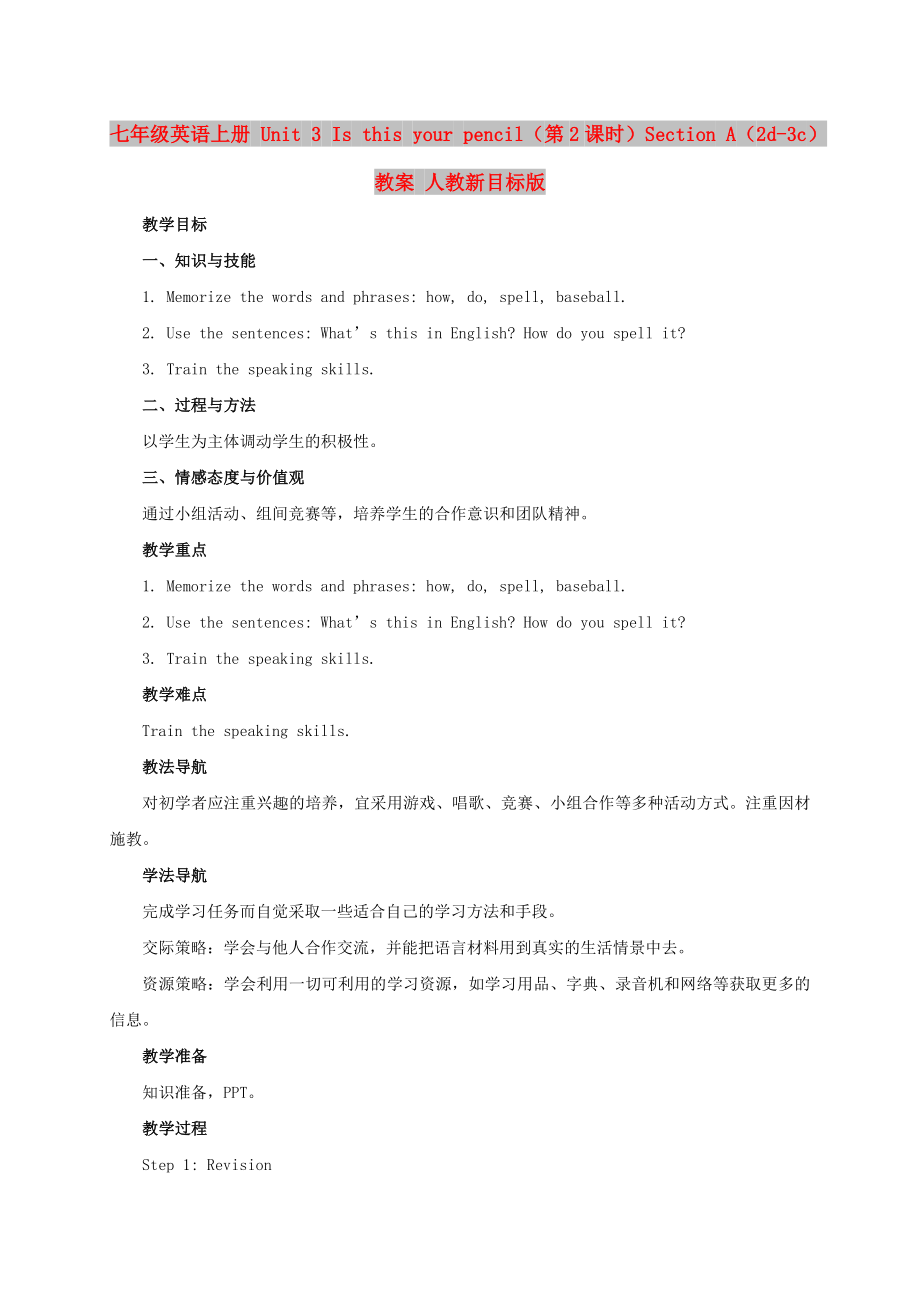《七年級(jí)英語上冊(cè) Unit 3 Is this your pencil(第2課時(shí))Section A(2d-3c)教案 人教新目標(biāo)版》由會(huì)員分享�����,可在線閱讀���,更多相關(guān)《七年級(jí)英語上冊(cè) Unit 3 Is this your pencil(第2課時(shí))Section A(2d-3c)教案 人教新目標(biāo)版(3頁珍藏版)》請(qǐng)?jiān)谘b配圖網(wǎng)上搜索。
1�、七年級(jí)英語上冊(cè) Unit 3 Is this your pencil(第2課時(shí))Section A(2d-3c)教案 人教新目標(biāo)版
教學(xué)目標(biāo)
一、知識(shí)與技能
1. Memorize the words and phrases: how, do, spell, baseball.
2. Use the sentences: What’s this in English? How do you spell it?
3. Train the speaking skills.
二�、過程與方法
以學(xué)生為主體調(diào)動(dòng)學(xué)生的積極性。
三����、情感態(tài)度與價(jià)值觀
通過小組活動(dòng)、組間競(jìng)賽等���,培養(yǎng)學(xué)生的合
2�����、作意識(shí)和團(tuán)隊(duì)精神����。
教學(xué)重點(diǎn)
1. Memorize the words and phrases: how, do, spell, baseball.
2. Use the sentences: What’s this in English? How do you spell it?
3. Train the speaking skills.
教學(xué)難點(diǎn)
Train the speaking skills.
教法導(dǎo)航
對(duì)初學(xué)者應(yīng)注重興趣的培養(yǎng),宜采用游戲��、唱歌���、競(jìng)賽�����、小組合作等多種活動(dòng)方式����。注重因材施教�����。
學(xué)法導(dǎo)航
完成學(xué)習(xí)任務(wù)而自覺采取一些適合自己的學(xué)習(xí)方法和手段�����。
3���、交際策略:學(xué)會(huì)與他人合作交流��,并能把語言材料用到真實(shí)的生活情景中去�。
資源策略:學(xué)會(huì)利用一切可利用的學(xué)習(xí)資源�����,如學(xué)習(xí)用品��、字典�����、錄音機(jī)和網(wǎng)絡(luò)等獲取更多的信息����。
教學(xué)準(zhǔn)備
知識(shí)準(zhǔn)備,PPT�。
教學(xué)過程
Step 1: Revision
Go over the words in last class. Show some pictures or real objects to the students. Have them say their names and spell them.
Ask students to make conversations by using the
4、 structures:
Is this/that your ...? Yes it is./No, it isn’t.
Step 2: Presentation
Put a pencil sharpener, a dictionary, a pen, an eraser and a ruler in a bag.
T: I have some things in this bag. You often use these things in class. Try to guess what they are. (When one student guesses the rig
5�����、ht object, give the object to him/her.)
Step 3: Grammar focus
Divide the class into two groups to say the questions and responses.
If there is something wrong, ask other students to correct.
Step 4: Work on 2d-3b
Ask the students to finish these tasks. Then let sevral students to report their
6、answers.
Check their answers.
Step 5: 拓展提升
1. T: Look at the five pictures. Who can say the names of the objects?
2. Demonstrate the conversation with a student:
T: What’s this in English?
S: It’s a pen.
T: How do you spell it?
S: P-E-N.
T: (Write the names of the objects on the board: penc
7�、il sharpener, dictionary, pen, eraser, ruler.)
Now work in pairs and make up five conversations like this.
Have five pairs present their conversations to the class.
Step 6: Work on 3c
Take out a box. Put your school things, such as pens, pencils, rulers, erasers into the box.
T: (Take out a pe
8、n from the box and ask one student.) Is this your pen?
S: Yes, it is./No, it isn’t.
T: Now work in pairs. Do it like this to guess the owner of one object. You only have two guesses.
Step 7: Conclusion
1. Learn the words and phrases in this class.
2. Grasp the target languages: What’s this in
9�����、English? It’s a/an ... How do you spell it?
Step 8: Homework
1. Memorize the words.
2. Act out the dialogues in activity 3.
3. Prepare next lesson.
課堂作業(yè)
重新給下列句子排序�����,使其成為一段完整的對(duì)話���。
A: Goodbye.
B: Thank you. Goodbye.
C: Is it your notebook?
D: B-A-C-K-P-A-C-K.
E: Oh, it’s a backpack.
F: By the way(順便問一下), what’s that in English?
G: How do you spell backpack?
H: Hi, Sam. Is this a notebook?
I: Yes, it is.
J: Yes, it is mine.
參考答案:H��、I�、C�、J、F���、E、G�����、D、B�����、A
教學(xué)反思
反復(fù)練習(xí)是本節(jié)課的關(guān)鍵�����,因此教師應(yīng)設(shè)計(jì)好相應(yīng)的任務(wù)����,使學(xué)生在輕松愉悅的氛圍中接受并掌握本節(jié)課內(nèi)容。
 七年級(jí)英語上冊(cè) Unit 3 Is this your pencil(第2課時(shí))Section A(2d-3c)教案 人教新目標(biāo)版
七年級(jí)英語上冊(cè) Unit 3 Is this your pencil(第2課時(shí))Section A(2d-3c)教案 人教新目標(biāo)版

